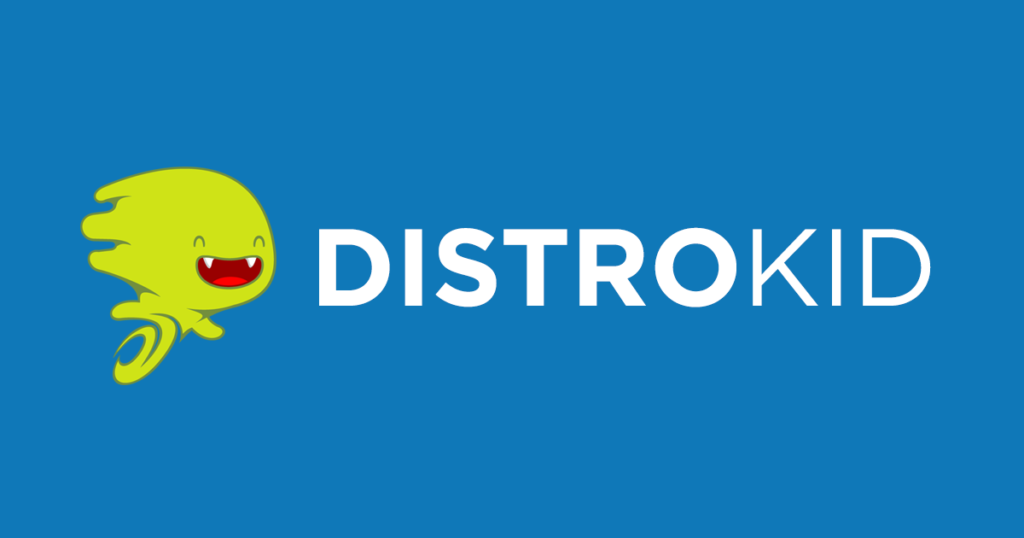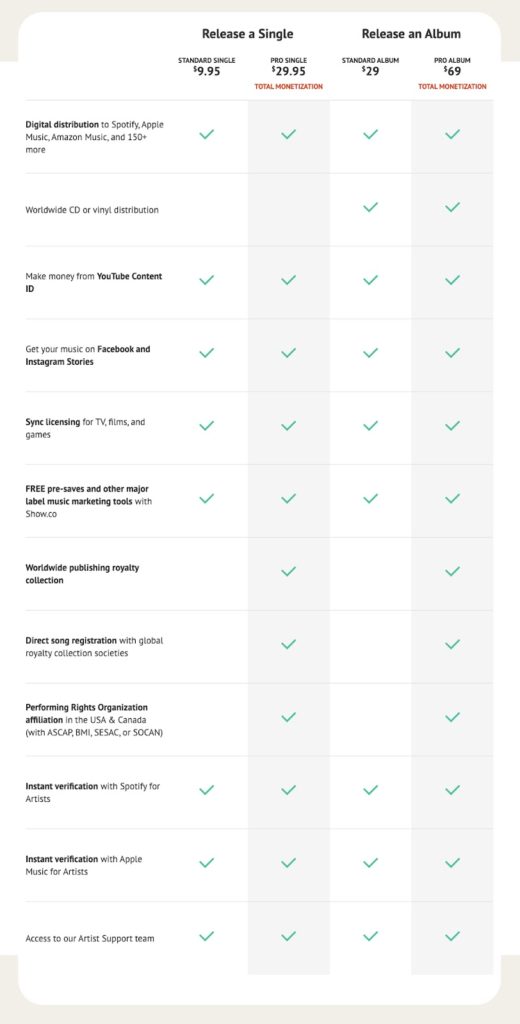DistroKid and CD Baby are two of the biggest names in music distribution right now. Both companies make it very easy for artists and bands to have their songs on streaming services and digital stores.
With that being said, there are still a lot of differences between these digital distribution platforms. You may want to learn them before considering sticking with one or another. DistroKid, for example, is known for its great price-value; CD Baby, for its number of extra services and features.
In this article, we will make a comparison between DistroKid vs CDBaby, putting side-to-side factors like pricing, delivery time, and additional services offered by each company.
If you’re in the process of choosing a music distributor, we also recommend you take a look at our Best Music Distribution guide. There, we review a selection of platforms such as Amuse and Record Union to decide which one is the best music distribution company of all.
Quick Introduction
DistroKid

DistroKid is a very popular music distributor founded back in 2013. One of the best features of the platform is it’s easy-to-understand pricing table and fair prices. You can release as much music as you want for as low as $19.99/year with the service.
CD Baby

CD Baby is one of the biggest and most experienced names in the music industry. Active since 1998, the company was one of the first to bring digital distribution to the major public and to simplify the process that the artists need to go through in order to release their music.
DistroKid vs CD Baby – In-Depth Review
Table of Contents
- Which One is More User Friendly?
- Pricing
- Streaming Services and Stores
- Delivery Time
- Commission
- Playlist Pitching
- Analytics
- Additional Services
- Referral Programs
- Customer Service
Which One is More User Friendly?
In our experience, it was very easy to go through CD Baby’s music upload process. You just have to specify your song’s information and provide the audio and album art files. There’s not much of a secret here and the artist won’t have to deal with complex stuff like music royalties and publishing information (though it is important to learn about these concepts).
With DistroKid, one thing that we didn’t like was that you have to pay the platform’s fees upfront and there’s no way to test it and see how the process works before you make an investment. Most reviews about the company seem to acknowledge that it is very easy to release music through the service, though.
Pricing
DistroKid

DistroKid pricing is very easy to understand and there’s no excess of information here. With a $19.99 yearly fee, you can upload unlimited songs, making the distributor great for those artists who release music frequently.
However, we recommend that musicians spend a little more and go straight with the Musician Plus plan ($35.99/year) since the most important features present in it such as daily sales stats and customizable release date are absent in the cheaper option.
DistroKid also offers a plan for labels. Starting at $79.99/year, a record label can release up to 5 artists and bands. This number is upgradable however and can go up to 100 artists/bands. You can also split the payment with your band members in any plan.
CD Baby

As you can see, CD Baby’s pricing table is extensive. The company basically offers two tiers for releasing a single or an album: Standard and Pro. Both standard plans will cover all of the basic features and same services you would expect from any distribution service such as:
- Distribution to 150+ streaming services and digital stores.
- Youtube Content ID integration.
- Sync licensing to get your music on TV, films, and games.
- Marketing tools such as pre-save.
- Instant verification with Spotify and Apple Music for Artists.
Both pro plans have a few extras and they mainly focus on monetization. As an independent artist, monetizing your music and collecting all the royalties that are yours can be a hard and extensive task, so CD Baby will simplify the process.
Album uploads also have the CD and vinyl physical distribution included on the plan: you can send your stock directly to CD Baby and they will take care of distributing it.
Tip: Also check our LANDR vs DistroKid article to see how DistroKid stands against this other very popular distribution platform.
Streaming Services and Stores
Both music distributors are releasing music to all of the main streaming platforms and online stores, however, they do differ a bit in the number of services they will send your song to.
DistroKid seems to focus more on high-quality major platforms such as Spotify, Apple Music, Google Play, and Amazon Music. They distribute to 31 popular platforms plus smaller outlets via their partnership with MediaNet.
CD Baby is all about offering the most options possible, with currently +150 platforms in their catalog. This is better for artists who are looking to achieve certain niches and more underground outlets.
Delivery Time
Knowing each platform’s delivery time is important so you plan your releases. After the initial review by the digital distributor, each streaming platform and store has its own timeframe for reviewing new music, but most of them don’t exceed two weeks.
DistroKid doesn’t specify an exact timeframe but claims to be able to review your song in a couple of days. CD Baby states that 5-10 business days are needed for inspection of new tracks.
Whatever the delivery time may be, we recommend that artists send their releases to the distributor at least two weeks prior to the release date so it will go live at the same time on all platforms and you have the time to promote it.
Commission
With DistroKid, you get to keep 100% of your royalties regardless of your plan. CD Baby takes 15% of your gains, on the other hand. If you choose to use their publishing administration service, you will receive 85% of all publishing royalties collected.
If you’re on a budget, we consider DistroKid to be more cost-effective since it is cheaper and you get to keep everything you earn. CD Baby’s commission is justifiable, though, if you’re looking to use their additional services.
Playlist Pitching
Most music distributors offer several opportunities for artists to have their music pitched to playlists. DistroKid has a few Spotify playlists that are updated weekly and their Wheel of Playlist feature, where you roll a prize wheel and get your track on one of their playlists on the position that the wheel lands.
CD Baby doesn’t manage any playlists, but they offer a handful of tools to promote your music and help you get pitched, such as the partnership with BandZoogle (website creation for artists) and HearNow (promotion tools platform); As well as instant Spotify and Apple Music for Artists verification.
There’s also a feature in CD Baby called Slaps, a social media designed for musicians and bands where artists can vote on other tracks so they get pitched to playlists; As well as get in touch with record labels.
Analytics
Both companies offer several stats regarding sales and download numbers. With DistroKid though, the daily sales stats are only available for the Musician Plus and up plans.
CD Baby states on their official support website that they can only provide partial data for Spotify and iTunes/Apple Music, but you can get instantly verified on the “For Artists” service on both of these platforms to see more detailed stats.
Additional Services
Regarding additional services, DistroKid doesn’t offer a lot of extras and prefers to focus solely on music distribution. There are a few additionals, though, that aren’t clearly specified. For example, you have to pay $0.99 to have your song on Shazam. We wish the company was more transparent on that matter.
CD Baby, on the other hand, focuses on offering a range of additional services. The company can, apart from distributing your music, administrate your releases’ publishing and register your song with different royalty-collection organizations across the world, as well as make YouTube Content ID and monetization easier to manage.
CD Baby also partnerships with the following websites:
- BandZoogle: easy website creation for artists and musicians.
- HearNow: music promotion platform with multiple tools. The website easily imports all of your track’s information directly from CD Baby.
- Show.co: music marketing platform more focused on social media.
- Radio Airplay: music discovery platform by style and genre.
Referral Programs
DistroKid has an affiliate program that will give you $10 for each artist you bring to the platform and 7% off for your guest’s first-year membership. Good if you want to invite a few friends to the service or have a following online that would be interested in music distribution. CD Baby doesn’t offer any referral programs at the time.
Customer Service
DistroKid’s customer service, based on multiple reviews we’ve researched, may take a little bit of time to respond to any issues you may run into. This is due to their platform being extremely automated.
CD Baby states that their response time is within two days if you request for a call-back. If your particular issue doesn’t need one, the company is available from 9 am to 5 pm (PST) Monday-Friday.
FAQ
Can You Switch from CDBaby to DistroKid (Or Vice-Versa)?
How Does CD Baby’s Worldwide CD or Vinyl Distribution Works?
CD Baby also has their own disc manufacturing service where you can select through different tiers and customize your CD or vinyl art and packaging.
Can I Distribute Cover Songs via DistroKid and CD Baby?

DistroKid vs CD Baby – Verdict
DistroKid
Pros
- Good pricing. Perfect for those on a budget: only $19.99/year for unlimited distribution.
- 0% Commission: you get to keep 100% of your royalties collected by the platform.
- Easy to use cover song licensing service.
- Referral Program: earn $10 and give 7% OFF the first year of a plan for any artist you invite to the platform.
- DistroKid offers payment splitting between members of a band or group. Great for independent musicians.
Cons
- Customer service is a bit slow due to the platform being highly automated.
- The daily stats are only available with the Musician Plus and Label plans.
CD Baby
Pros
- Lots of additional services such as Youtube Content ID managing.
- Publishing administration service makes it much easier for artists to collect publishing royalties.
- The company will automatically register your songs with multiple royalty-collection organizations across the world.
- Partnership with multiple websites and services that are useful for artists, such as BandZoogle (artist website creator) and HearNow (promotion tools for artists).
- Slaps, a social media designed for bands and musicians. Artists can vote on their favorite songs to be pitched for playlists and get in touch with record labels.
- Physical distribution of CD or Vinyl.
Cons
- Each single and album is charged separately so the costs may quickly add up if you release a lot of music.
- No referral program.
Both music distributors performed very well in our tests. They are easy to use and straight to the point: you can have your music online with a few steps. However, we’ve found DistroKid prices to be more cost-effective, especially for independent artists and people on a budget. Starting at $19.99/year you can upload unlimited releases to the website.
CD Baby, on the other hand, shines when it comes to additional services. Not many distributors offer Youtube Content ID managing, publishing administration services, and even physical distribution of CD or vinyl integrated with their system like the company does. The choice will come down to your priorities and at what step you are in your music career right now.
We hope this article was helpful. Before you make your choice, also consider checking our other related comparisonguides. We’ve compared multiple companies on them: DistroKid, CDBaby, LANDR, RecordUnion, Amuse, to name a few. Don’t be afraid to share your thoughts and get in touch if you have any questions we can help with!
Ian Sniesko is an experienced music producer and musician who loves to share his knowledge about the best audio equipment for making and enjoying great music. For the past 6 years, Ian has written extensively about the audio equipment industry and has contributed to many of the top music magazines.